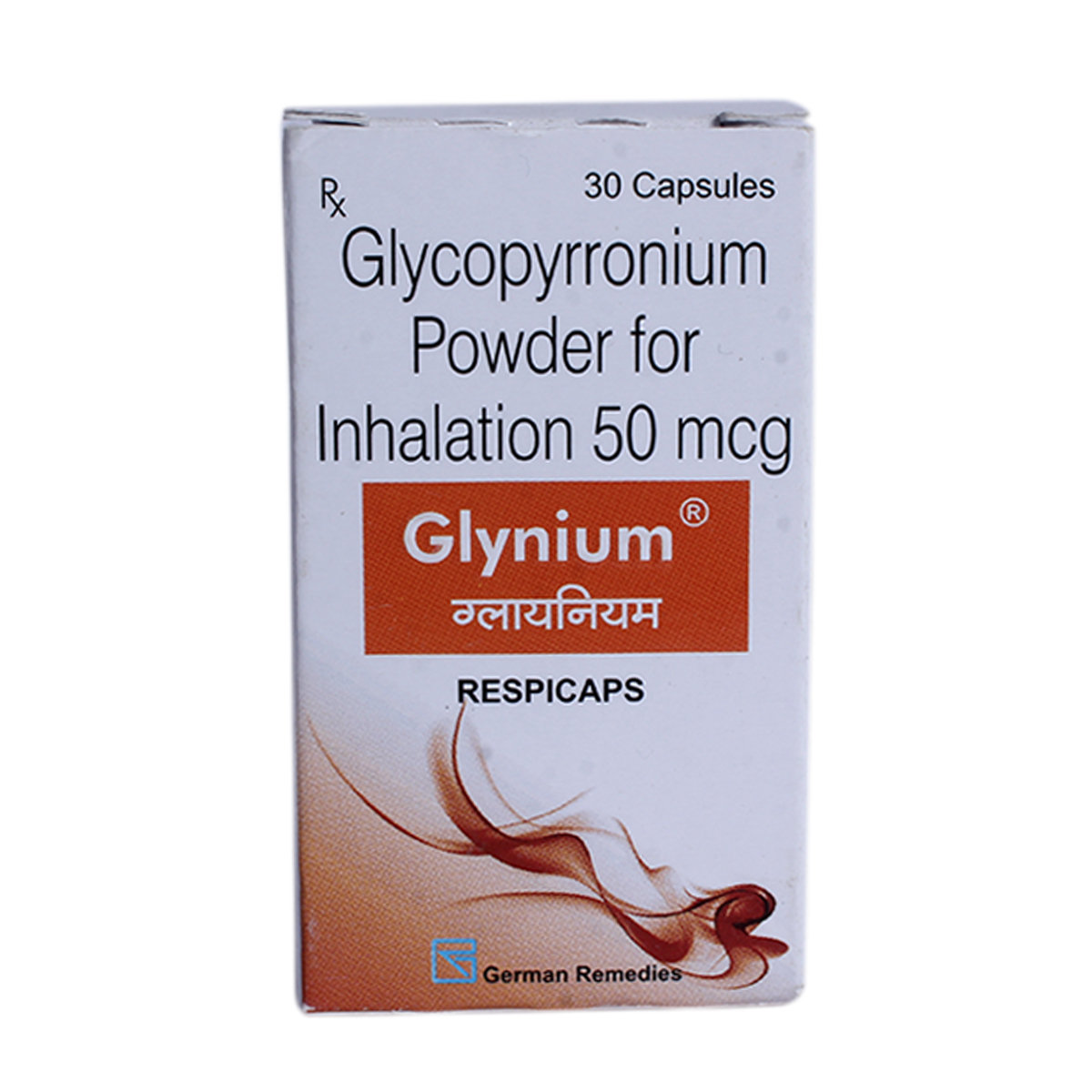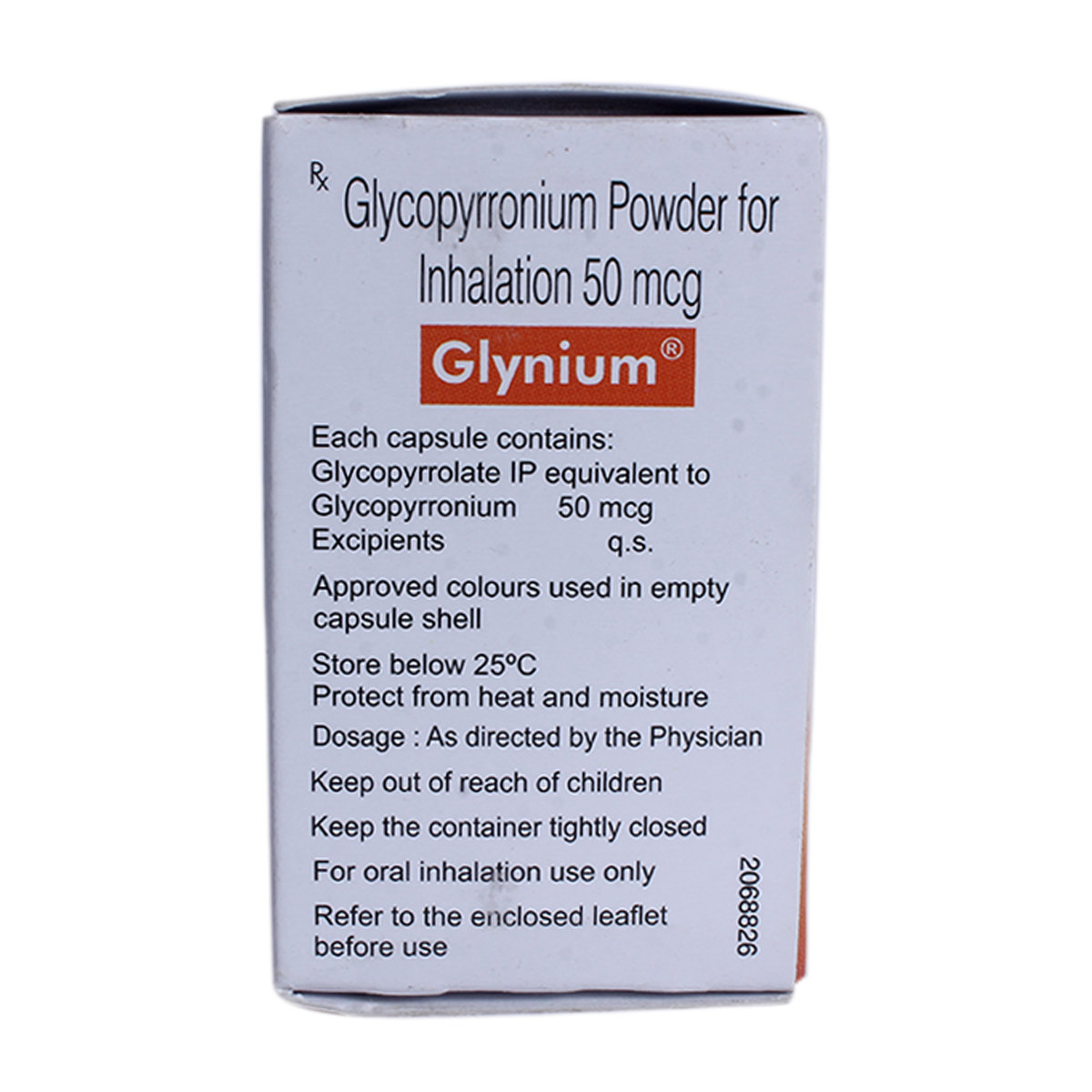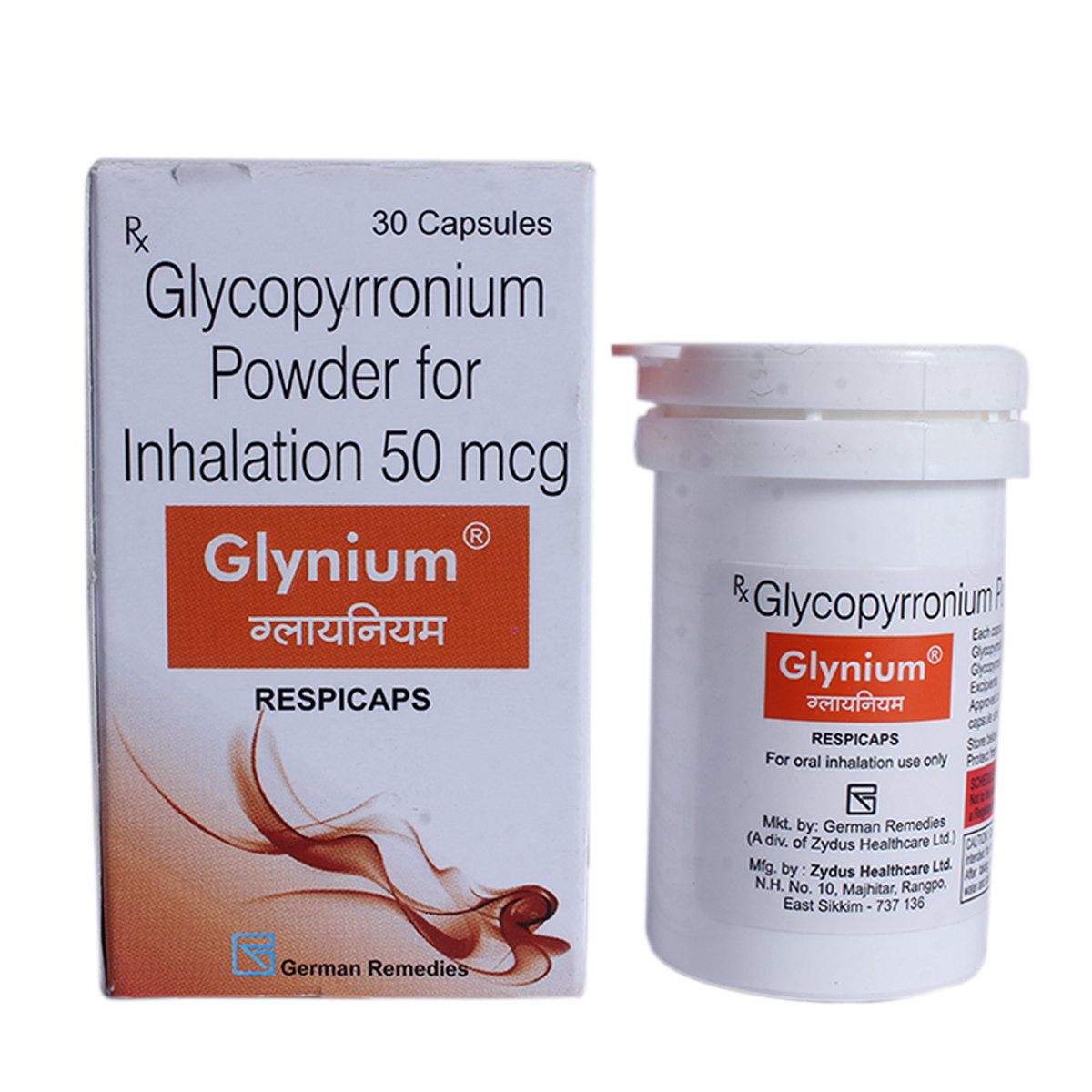Glynium Respicap 30's
MRP ₹521.5
(Inclusive of all Taxes)
₹78.2 Cashback (15%)
Provide Delivery Location
Online payment accepted
 Prescription drug
Prescription drugWhats That
Composition :
Manufacturer/Marketer :
Consume Type :
Expires on or after :
Return Policy :
About Glynium Respicap
Glynium Respicap belongs to the group of medicines called anticholinergics indicated for long-term, maintenance treatment of airflow obstruction in patients with Chronic Obstructive Pulmonary Disease (COPD), including emphysema and/or chronic bronchitis. COPD is a lung disease that blocks airflow and makes it difficult to breathe.
Glynium Respicap contains 'Glycopyrrolate', which works by relaxing the muscles around the airways in the lungs, thus making it easier to breathe. Thereby, Glynium Respicap helps in the treatment of wheezing, coughing, shortness of breath, and chest tightness.
In some cases, Glynium Respicap may cause common side effects such as upper respiratory tract infection, nasopharyngitis (common cold), urinary tract infection, and nausea. Most of these side effects do not require medical attention and will resolve gradually over time. However, if the side effects persist or worsen, consult a doctor.
Glynium Respicap is for inhalation only; do not inject or swallow. Consult your doctor if you are pregnant or breastfeeding. Glynium Respicap is not recommended for children as safety and effectiveness have not been established. Keep your doctor informed about your health condition and medications to avoid unpleasant side effects/interactions.
Uses of Glynium Respicap
Directions for Use
Key Benefits
Glynium Respicap belongs to the group of medicines called anticholinergics indicated for long-term, maintenance treatment of airflow obstruction in patients with Chronic Obstructive Pulmonary Disease (COPD), including emphysema and/or chronic bronchitis. Glynium Respicap contains 'Glycopyrrolate', which works by relaxing the muscles around the airways in the lungs, thus making it easier to breathe. Thereby, Glynium Respicap helps in the treatment of wheezing, coughing, shortness of breath, and chest tightness.
Storage
- Inform your doctor about dry mouth symptoms. They may adjust your medication regimen or prescribe additional medications to manage symptoms.
- Drink plenty of water throughout the day to help keep your mouth moist and alleviate dry mouth symptoms.
- Chew sugar-free gum or candies to increase saliva production and keep your mouth moisturized.
- Use saliva substitutes, such as mouthwashes or sprays, only if your doctor advises them to help moisturize your mouth and alleviate dry mouth symptoms.
- Avoid consuming smoking, alcohol, spicy or acidic foods, and other irritants that may aggravate dry mouth symptoms.
- Schedule regular dental check-ups to keep track of your oral health and handle any dry mouth issues as they arise.
- Hydrate your body: Drink enough water to prevent dehydration and headaches.
- Calm Your Mind: Deep breathing and meditation can help you relax and relieve stress.
- Rest and Recharge: Sleep for 7-8 hours to reduce headache triggers.
- Take rest: lie down in a quiet, dark environment.
- Cold or warm compresses can help reduce tension.
- Stay Upright: Maintain good posture to keep symptoms from getting worse.
- To treat headaches naturally, try acupuncture or massage therapy.
- Over-the-counter pain relievers include acetaminophen and ibuprofen.
- Prescription Assistance: Speak with your doctor about more substantial drug alternatives.
- Severe Headaches: Seek emergency medical assistance for sudden, severe headaches.
- Frequent Headaches: If you get reoccurring headaches, consult your doctor.
- Headaches with Symptoms: Seek medical attention if your headaches include fever, disorientation, or weakness.
- Inform your doctor about your constipation symptoms. They may adjust your medication or advise alternative treatments.
- Stay hydrated by drinking sufficient of water (at least 8-10 glasses a day) to help soften stool and promote bowel movements.
- Increase fibre intake by eating foods high in fibre, such as fruits, whole grains, vegetables and legumes, to help bulk up the stool.
- Establish a bowel routine by trying to go to the bathroom at the same time each day to train your bowels.
- Engaging in regular exercise, like walking or yoga, can support in bowel movement stimulation.
- Consult your doctor if constipation persists, and discuss alternative treatments or adjustments to your medication.
Drug Warnings
Do not use Glynium Respicap if you are allergic to any of its components. Inform your doctor if you have glaucoma, prostate or bladder problems, irritable bowel syndrome, urinary retention, motion sickness, Parkinson's disease, ulcers, or kidney or liver problems. Consult your doctor if you are pregnant or breastfeeding. Glynium Respicap is not recommended for children below 18 years as safety and effectiveness have not been established. Let your doctor know if you are taking any prescription/non-prescription medicines, vitamins, nutritional supplements, or herbal products.
Drug-Drug Interactions
Drug-Drug Interactions
Login/Sign Up
Co-administration of Digoxin and Glynium Respicap may increase the serum concentration of Digoxin and increase the risk or severity of adverse effects.
How to manage the interaction:
Although there is a possible interaction between Digoxin and Glynium Respicap, you can take these medicines together if prescribed by a doctor. However, if you experience sudden dizziness, lightheadedness, fainting, shortness of breath, confusion, loss of appetite, nausea, vomiting, diarrhea, change in vision such as blurry or yellow vision, fatigue, and fast or irregular heartbeat, contact your doctor immediately. Do not discontinue any medications without first consulting your doctor.
The use of Potassium chloride and Glynium Respicap can increase the irritant effects of potassium on your stomach and upper intestine.
How to manage the interaction:
Using Potassium chloride and Glynium Respicap together can lead to an interaction, however, it can be taken if advised by a doctor. However, if you experience severe stomach pain, bloating, sudden lightheadedness or dizziness, nausea, vomiting (especially with blood), decreased hunger, or dark, tarry stools, consult the doctor immediately. Do not discontinue any medications without a doctor's advice.
Taking Pramlintide with Glynium Respicap can cause slow stomach emptying or slow the intestinal absorption of nutrients.
How to manage the interaction:
Although using Pramlintide and Glynium Respicap together can lead to an interaction, it can be taken if advised by your doctor.
The combined use of secretin and Glynium Respicap can inhibit gastric acid secretion.
How to manage the interaction:
Although using secretin and Glynium Respicap together can lead to an interaction, it can be taken if advised by your doctor.
Coadministration of levodopa with Glynium Respicap can significantly decrease the blood levels of levodopa.
How to manage the interaction:
Although using Glynium Respicap and levodopa together can lead to an interaction, it can be taken if advised by your doctor. However, if you experience any unusual symptoms contact the doctor immediately. Do not stop using any medications without a doctor's advice.
Drug-Food Interactions
Drug-Food Interactions
Login/Sign Up
Diet & Lifestyle Advise
- Eat a healthy diet and exercise regularly to strengthen your breathing muscles and boost your immune system.
- Avoid foods such as cabbage, beans, garlic, onions, shrimp, pickled food, dried fruits, fried foods, carbonated drinks, wine, and bottled lemon and lime juice, as it may worsen symptoms.
- Do meditation, deep breathing, regular exercise and try progressive muscle relaxation techniques to get relief from stress and reduce the risk of an attack.
- Quit smoking as it may irritate the lungs and worsen breathing problems.
- Learn breathing exercises like pursed-lip breathing. It helps provide relief from COPD.
Side Effects of Glynium Respicap
- Upper respiratory tract infection
- Nasopharyngitis (common cold)
- Urinary tract infection
- Nausea
- Headache
- Fatigue
Habit Forming
Therapeutic Class
All Substitutes & Brand Comparisons
Author Details
We provide you with authentic, trustworthy and relevant information
Drug-Diseases Interactions
Drug-Diseases Interactions
Login/Sign Up
FAQs
Disease/Condition Glossary
Chronic Obstructive Pulmonary Disease (COPD): It is a group of lung diseases with emphysema (shortness of breath) and chronic bronchitis (inflammation of the lining of bronchial tubes). The major cause of COPD is smoking tobacco. Also long-term exposure to fumes and chemicals may also lead to COPD. The symptoms include chronic cough, shortness of breath or wheezing (whistle sound while breathing).

Have a query?
Alcohol
Safe if prescribed
It is not known if alcohol affects Glynium Respicap . Please consult your doctor if you have any concerns.
Pregnancy
Consult your doctor
If you are pregnant, please consult your doctor before using Glynium Respicap ; your doctor will prescribe only if the benefits outweigh the risks.
Breast Feeding
Consult your doctor
It is not known if Glynium Respicap passes into breastmilk. If you are breastfeeding, consult your doctor before using Glynium Respicap .
Driving
Safe if prescribed
Glynium Respicap has no influence on the ability to drive and use machines.
Liver
Consult your doctor
Please consult your doctor if you have liver impairment/liver disease or any concerns regarding this before using Glynium Respicap .
Kidney
Consult your doctor
Please consult your doctor if you have kidney impairment/kidney disease or any concerns regarding this before using Glynium Respicap .
Children
Safe if prescribed
The use of Glynium Respicap in children is not advised. The safety and efficacy of this medicine in paediatric patients are unknown.









_0.jpg?tr=q-85)

